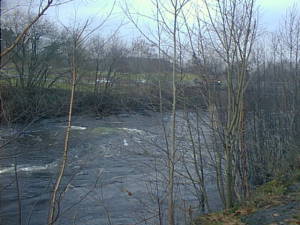Saturday 25 November 2000

|
Pic of the day: The rain is gone, but the river is still swollen with water after over 50 days of rain. Freaky weather! Turning up the heatAs I started my walk to the grocery shop today, I noticed first that it was not raining, for a change. Next, I noticed that I was shivering with the cold autumn air. Now, that is a problem easily solved. I just ordered my body to relax and stop the shivering, because my walking in the hilly terrain would soon generate plenty of heat. And it's not like it was below the freezing point or anything. But the chill has definitely settled. I have the heating cables turned on in my apartment, in the floors. Now and then I even turn one of the rooms up to the second level of floor heating. It's clean, hydroelectric power that makes up most of the electricity here in Norway. So it only heats once, unlike the oil and coal burning power plants of most other civilized nations. ***I read on the Net that the climate meeting in the Netherlands had failed, and that leaders were leaving in anger. As can be expected, the USA was prominently blamed. Norwegian media tactfully downplayed the Norwegian attempts to twist the negotiations so that we could increase our greenhouse gas emissions instead of reducing them. The Haag (Hague) meeting was to be a follow-up to the Kyoto summit where a vague deal was struck to curb greenhouse gas emission. In the years that have passed since Kyoto, a couple countries have actually reduced their emissions, while most have increased theirs. Not least my native Norway, which claims that we are in a special situation since we export clean natural gas to other countries so they can burn it instead of dirty coal. Actually, the other kinds of pollution from coal are irrelevant in this matter - it's CO2 (carbon dioxide) that is the main greenhouse gas, and all fossil fuels produce this when they burn. The continued high price of oil, despite a high production, shows that the world is burning fuel at a furious rate. It's unlikely that anything less than an economic setback can change this. Though if the fuel prices remain historically high, we may see more energy from renewable sources such as wind and sun. Also more efficient use of fossil fuel, such as fuel cells that burn natural gas with the help of catalysts, at moderate temperatures and with a high output of energy in the form of electricity. In the meantime, CO2 continues to accumulate in the atmosphere. The greenhouse effect is pretty much a scientific fact: It can be observed during controlled experiments here on Earth, and it is very prominent on a nearby planet we like to compare with: Venus. Our sister planet is slightly smaller and somewhat closer to the sun. Until a few decades ago, it was believed that it might harbor life similar to Earth, as the planets are both within "life-bearing" distance from the Sun. Venus was supposed to be a steaming, tropical world. It is not. Thanks to its atmosphere mostly of CO2, Venus is more like medieval hell. It is hot enough to melt lead, as the Sun's heat is trapped in the dense atmosphere. Life as we imagine it is utterly impossible in this inferno. No wonder some people are worried, when we continue to pump CO2 into our own atmosphere. ***The atmosphere of Venus consists almost completely of CO2. Not so ours. With approximately 20% oxygen and 79% nitrogen, there isn't a lot of space left for other elements. And CO2 is only a small part of what is left. Actually, the industrial revolution has raised the levels from around 0.03% to 0.035% - hardly toxic levels by any stretch of the imagination. Even so, it is probably enough to change the Earth's climate somewhat. Not that the climate is just sitting there, waiting for us to change it. Oh no. It is fluctuating wildly, on several different frequencies, and probably some random too. So it's pretty hard to pick out what changes we humans have wrought, if any. Theoretically we should make some difference by now, but it is hard to point it out. We don't even know the underlying trend. We do know the long-run trend, though. We are in an "interglacial", the short pause between two ice ages. Each of these last about 100 000 years, while the warm ice-free time typically lasts 10-20 000 years. The highest temperatures came fairly shortly after the ice sheets melted - at this point, even much of Antarctica must have been ice free. Since then, the temperature has gradually dropped, but in fits and starts. At the end of medieval times in Europe, a strong cooling started, culminating in the "little ice age" which brought starvation to much of Northern Europe. The river Thames in London was frozen over, the sea between Sweden and Denmark was thick enough for troops to march over. Luckily, the heat returned for a while. After "the hottest decade for over a century" we are back to about the conditions that persisted during the Viking age, but we have still quite a way to go before we reach the temperatures of the Bronze age or the time of the Great Pyramid. And it's not like the oceans boiled off then. Perhaps the man-made greenhouse effect has saved the world from a new ice age, which otherwise might have hit us now. That is a ... chilling thought. Keep the flame burning, folks. |
Yesterday <-- This month --> Tomorrow?
One year ago
Two years ago